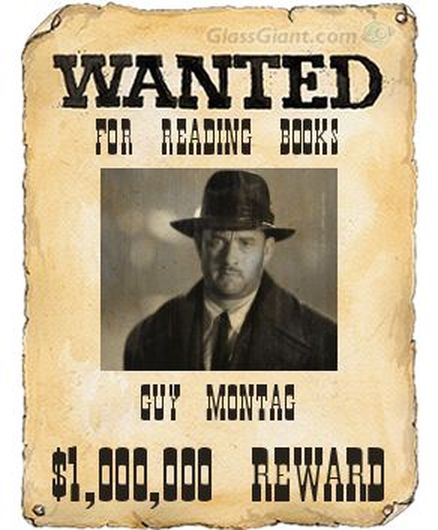I feel that the most dynamic character in the novel,
Fahrenheit 451 was Guy Montag. He was the most dynamic character in the book because he changed and developed so much from the beginning of the book to the end of the book. Also if Montag hadn't changed none of the events that took place never would've happend.
In the beginning of the book Montag is the model citizen in a dystopian society that controls everything and has outrageous laws. He never breaks any rules, never thinks for himself, never questions the government or society, and just goes with the flow. As guy says in the beginning of the book when he is talking with Clarisse, "Of course I'm happy. what does she think? I'm
not?" (Bradbury, pg. 8) This shows that at the start of the novel, Montag was happy with his current position as a firemen, husband, and citizen of his society.
After this point in the book, Montag's character is never truly the same. He is constantly thinking about the question that Clarisse asked him, of wether or not he is happy. And that becomes Montag's journey and adeventure for the remainder of the book. Montag starts exploring his life, job, and society to see if he really is happy. After some time, Montag comes to the conclusion that he isn't truly happy, that he was in turn, really just wearing a mask of happiness like the rest of the society.

At the end of the book we see Montag become a outlaw in the eyes of the government, he starts asking questions, thinking for himself, and starts reading books. An example of when Montag begins thinking for himself is when he says" I'mnot thinking. I'm just doing like I'm told, like always. You said get the money and I got it. I didn't really think of it myself. when do I start working things out on m own?" (Bradbury, pg.88) Since Montag is a firemen, it is his job to burn houses that have books in them since it is illegal to have possesion of or read books. So, wehn Montag beginnings reading books his house gets burned down by Chief Beatty. After some events that un-fold at the house Montag goes on the run as a wanted fugitive for killing Chief Beatty and other firemen but also for having books.
By the very end of the story Guy Mntag has become an entirely different person from the beginnig of the book. Now he is an independent person who thinks for himself.
This relates to our in-class discussion about if Montag is truly happy, and if not will he ever find true happiness.

